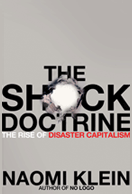The Shock Doctrine

Disaster Capitalism in Action: banks
Wall Street Stealth Lobby Defends $35 Billion Derivatives Haul
Christine Harper, Matthew Leising and Shannon Harrington, Bloomberg News, August 31, 2009
"Wall Street is suiting up for a battle to protect one of its richest fiefdoms, the $592 trillion over-the-counter derivatives market that is facing the biggest overhaul since its creation 30 years ago.
"Five U.S. commercial banks, including JPMorgan Chase & Co., Goldman Sachs Group Inc. and Bank of America Corp., are on track to earn more than $35 billion this year trading unregulated derivatives contracts. At stake is how much of that business they and other dealers will be able to keep....
"The Washington fight, conducted mostly behind closed doors, has been overshadowed by the noisy debate over health care. That’s fine with investment bankers, who for years quietly wielded their financial and lobbying clout on Capitol Hill to kill efforts to regulate derivatives. This time could be different. The reason: widespread public and Congressional anger over the role derivatives such as credit-default swaps played in the worst financial crisis since the Great Depression."
Banks 'Too Big to Fail' Have Grown Even Bigger
David Cho, Washington Post, August 28, 2009
"The crisis may be turning out very well for many of the behemoths that dominate U.S. finance. A series of federally arranged mergers safely landed troubled banks on the decks of more stable firms. And it allowed the survivors to emerge from the turmoil with strengthened market positions, giving them even greater control over consumer lending and more potential to profit.
"J.P. Morgan Chase, an amalgam of some of Wall Street's most storied institutions, now holds more than $1 of every $10 on deposit in this country. So does Bank of America, scarred by its acquisition of Merrill Lynch and partly government-owned as a result of the crisis, as does Wells Fargo, the biggest West Coast bank. Those three banks, plus government-rescued and -owned Citigroup, now issue one of every two mortgages and about two of every three credit cards, federal data show....
"The worry for consumers is that the bailouts skewed the financial industry in favor of the big and powerful. Fresh data from the FDIC show that big banks have the ability to borrow more cheaply than their peers because creditors assume these large companies are not at risk of failing. That imbalance could eventually squeeze out smaller competitors. Already, consumers are seeing fewer choices and higher prices for financial services, some senior government officials warn."
Wall Street Repackages Toxic Debt (Again)
Matt Apuzzo, Associated Press, August 24, 2009
"Wall Street may have discovered a way out from under the bad debt and risky mortgages that have clogged the financial markets. The would-be solution probably sounds familiar: It's a lot like what got banks in trouble in the first place.
"In recent months investment banks have been repackaging old mortgage securities and offering to sell them as new products, a plan that's nearly identical to the complicated investment packages at the heart of the market's collapse....
"In recent months, banks have tiptoed toward a possible solution, one in which the really good bonds get bundled with some not-quite-so-good bonds. Banks sweeten the deal for investors and, voila, the newly repackaged bonds receive AAA ratings, a stamp of approval that means they're the safest investment you can buy. 'You've now taken what was an A-rated security and made it eligible for AAA treatment,' said Richard Reilly, a partner with White & Case in New York."
Big Banks Marketing Risky Lending Practices
Jessica Silver-Greenberg, Theo Francis and Ben Levisohn, Business Week, August 5, 2009
"In recent months such big banks as Bank of America (BAC), Citigroup (C), and JPMorgan Chase (JPM) have rolled out newfangled corporate credit lines tied to complicated and volatile derivatives. Others, including Wells Fargo (WFC) and Fifth Third (FITB), are offering payday-loan programs aimed at cash-strapped consumers. Still others are marketing new, potentially risky 'structured notes' to small investors....
"Some of Wall Street's latest innovations give reason for pause. Consider a trend in business loans. Lenders typically tie corporate credit lines to short-term interest rates. But now Citi, JPMorgan Chase, and BofA, among others, are linking credit lines both to short-term rates and credit default swaps (CDSs), the volatile and complicated derivatives that are supposed to act as "insurance" by paying off the owners if a company defaults on its debt. JPMorgan, BofA, and Citi declined to comment.
"In these new arrangements, when the price of the CDS rises—generally a sign the market thinks the company's health is deteriorating—the cost of the loan increases, too. The result: The weaker the company, the higher the interest rates it must pay, which hurts the company further.
"The lenders stress that the new products give them extra protection against default. But for companies, the opposite may be true. Managers now must deal with two layers of volatility—both short-term interest rates and credit default swaps, whose prices can spike for reasons outside their control."
Banks Paid $32.6 Billion in Bonuses Amid U.S. Bailout
Karen Freifeld, Bloomberg News, July 30, 2009
"Citigroup Inc., Merrill Lynch & Co. and seven other U.S. banks paid $32.6 billion in bonuses in 2008 while receiving $175 billion in taxpayer funds, according to a report by New York Attorney General Andrew Cuomo.
"Cuomo analyzed 2008 bonuses at nine banks that received Trouble Asset Relief Program financing from the U.S. government. New York-based Citigroup and Merrill, which has since been taken over by Bank of America Corp., received TARP funding totaling $55 billion, Cuomo said.
" 'When the banks did well, their employees were paid well. When the banks did poorly, their employees were paid well,' Cuomo’s office said in the 22-page report. 'When the banks did very poorly, they were bailed out by taxpayers and their employees were still paid well. Bonuses and overall compensation did not vary significantly as profits diminished.'"
Lending By Bailed Out Banks Continues to Fall
Martin Crutsinger, Associated Press, June 15, 2009
"The value of loans held by the 21 largest institutions getting support from the government's $700 billion bailout fund fell in April, the fifth decline in six months....
"The big banks included in Treasury's monthly loan survey account for more than half of the net loans outstanding at financial institutions."
Banks Use Life Insurance to Fund Bonuses
Ellen E. Schultz, Wall Street Journal, May 20, 2009
"Banks are using a little-known tactic to help pay bonuses, deferred pay and pensions they owe executives: They're holding life-insurance policies on hundreds of thousands of their workers, with themselves as the beneficiaries.
Banks took out much of this life insurance during the mortgage bubble, when executives' pay -- and the IOUs for their deferred compensation -- surged, and banking regulators affirmed the use of life insurance as a way to finance executive pay and benefits.
"Bank of America Corp. has the most life insurance on employees: $17.3 billion at the end of the first quarter, according to bank filings. Wachovia Corp. has $12 billion, J.P. Morgan Chase & Co. has $11.1 billion and Wells Fargo & Co. has $5.7 billion....
"Though not improper, the practice is similar to what is known as 'janitors insurance,' an insurance-on-employees technique that has long been controversial. Critics say the banks' insurance contracts are a way for companies to create tax breaks for funding executive pensions. And some families have complained that employers shouldn't profit from the deaths of their loved ones."
Wall Street Pay Returning to Outrageous 2008 Level
Louise Story, New York Times, April 26, 2009
"Workers at the largest financial institutions are on track to earn as much money this year as they did before the financial crisis began, because of the strong start of the year for bank profits. Even as the industry’s compensation has been put in the spotlight for being so high at a time when many banks have received taxpayer help, six of the biggest banks set aside over $36 billion in the first quarter to pay their employees, according to a review of financial statements....
"Of the large banks receiving federal help, Goldman Sachs stands out for setting aside the most per person for compensation. The bank, which nearly halved its compensation last year, set aside $4.7 billion for worker pay in the quarter. If that level continues all year, it would add up to average pay of $569,220 per worker — almost as much as the pay in 2007, a record year."
Financial Firms Lobby to Cut Cost of TARP Exit
Damian Paletta and Deborah Solomon, Wall Street Journal, April 22, 2009
"The banking industry is aggressively lobbying the Treasury Department to make it less costly for financial institutions to get out of the Troubled Asset Relief Program. The move could prove controversial for the banking industry, which is busy deflecting criticism about higher fees it is charging consumers for credit cards and other products and services.
"At issue are 'warrants' the government received when it bought preferred stock in roughly 500 banks over the past six months as part of TARP. The warrants allow the government to buy common stock in the banks at a later date so taxpayers can receive more of a return on their investment when the banking industry recovers.
"Many banks want to return their TARP money and, as part of that effort, want to expunge the warrants. To do that, banks must either buy them back from the government or allow the Treasury to sell them to private investors. Today, most of the warrants are essentially worthless, because their exercise price is higher than where most banks' stocks are trading. But the government believes the warrants still have value, since they give the Treasury the right to buy common stock at a set price for 10 years."
See Also:
Letter from the American Bankers Association urging the Treasury Department to break provisions in existing contracts with the banks.
Lending by Bailed Out Banks Keeps Dropping
, Wall Street Journal, April 20, 2009
Lending at the biggest U.S. banks has fallen more sharply than realized, despite government efforts to pump billions of dollars into the financial sector.
According to a Wall Street Journal analysis of Treasury Department data, the biggest recipients of taxpayer aid made or refinanced 23% less in new loans in February, the latest available data, than in October, the month the Treasury kicked off the Troubled Asset Relief Program. The total dollar amount of new loans declined in three of the four months the government has reported this data.














